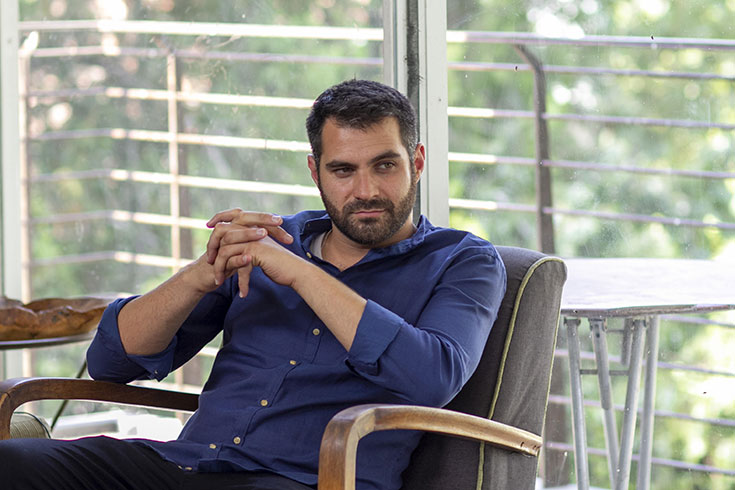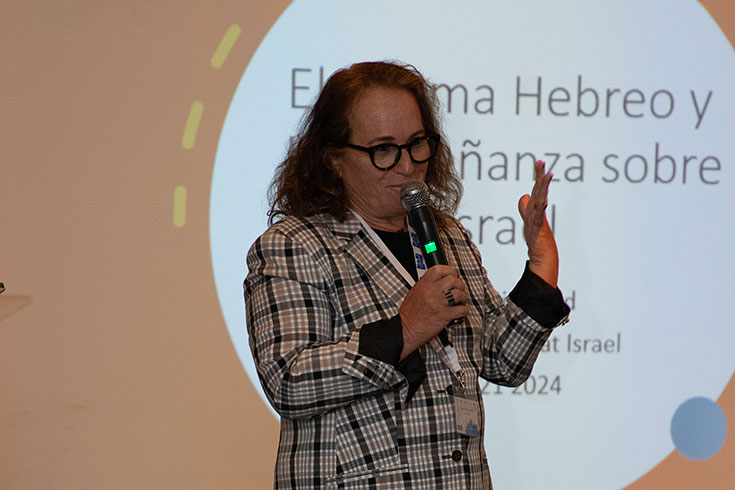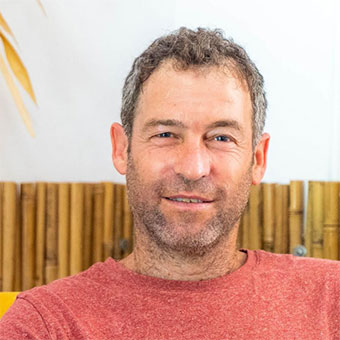Past Events
2025
November 21, 2025
Research on “Teachers’ Perceptions on Supporting Students with Learning Disabilities,” conducted by Prof. Vardit Ringvald and Omri Shick, was presented at the annual convention of the American Council on the Teaching of Foreign Languages (ACTFL), which was held in New Orleans in November.September 8, 2025
Prof. Ringvald presented alongside Dr. Liram Koblentz-Stenzler their joint research, regarding the Role of Hebrew Language Programs in Combating Antisemitism Among University Students. This research was conducted as part of The Hebrew Consortium's research unit.A second presentation given by Prof. Ringvald alongside her colleague from The Hebrew Consortium, Sharon Schoenfeld, in this conference discussed their recent research on Hebrew teachers' perception of their role post October 7. The research is now published as a chapter in a book titled "Education after October 7th: Essays about Teaching and Learning in the Jewish Diaspora".
September 4, 2025
The Hebrew Consortium Director, Prof. Vardit Ringvald, participated in the 4th International Colloquium, organized by Universidad Hebraica. In the colloquium, Prof. Ringaval led a panel named The Place of Language in the Construction of Cultural Identity. Keynote speakers of the colloquium included Bonny Norton, widely known for developing identity theories in the field of Second Language Acquisition.July 1, 2025
Prof. Vardit Ringvald returned once again to the international conference of the National Association of Professors of Hebrew (NAPH), which took place in London in June 2025.
Prof. Ringvald presented her research about “Hebrew Education after October 7th,” which was conducted in collaboration with Sharon Schoenfeld.
June 11, 2025
Continuing her support of Hebrew education worldwide, Prof. Ringvald taught a 1-hour Webinar named "Navigating a Bilingual Reality: How to preserve mother tongue Hebrew while integrating into Australian society".The focus of this talk was helping educators to better understand and reflect on how to maintain and develop children's Hebrew skills while facilitating their integration in an English-speaking context.
April 23, 2025
The Brandeis Seminar on Contemporary Jewish Life (CJL) is the meeting ground for members to explore the culture, education, politics, art, literature, history, and sociology of contemporary Jews and Judaism. The organization's monthly meetings feature panel discussions of pertinent topics or opportunities for members of the Brandeis CJL community to share their work in an environment of constructive critique.Prof. Ringvald presented findings from her research about “Hebrew Education after October 7th,” which was conducted in collaboration with Sharon Schoenfeld, at the Mandel Center for Studies in Jewish Education’s Seminar on Contemporary Jewish Life (CJL) at Brandeis University in April.
2024
September 20, 2024
The Israeli-American Council (IAC) held its National Summit in Washington, D.C., over a long weekend in September. The conference included various tracks, with a special educators' track introduced this year. The educators' track was geared toward those involved in Jewish and Hebrew education, including educators from Jewish day schools, public schools, summer camps, and more.The conference offered educators a professional development opportunity focusing on Israel education and Hebrew teaching for diaspora educators. Topics included innovative approaches to teaching Hebrew, using children’s literature for cultural and linguistic connections, and inspiring the next generation by integrating Israel into the identity of Jewish American children through learning.
Prof. Ringvald gave a lecture on a subject close to her heart: raising bilingual children who speak both Hebrew and English. Prof. Ringvald shared insights from the fields of Hebrew language education, bilingualism, and child psychology. This lecture was part of a new special interest group forming at The Hebrew Consortium, geared toward parents who want to support their children's Hebrew learning both at home and beyond.
September 3, 2024
The annual Jewish and Hebrew Education Symposium is the only national training event specifically designed for Jewish and Hebrew educators, educational leaders, informal educators, and adult educators in South Africa. As such, it provides a unique platform for educators of all backgrounds to come together and connect. The conference is held over two days, with the first day in Johannesburg and the second day in Cape Town.At this year's conference, Prof. Ringvald was invited to give a talk on teaching culture and its importance in a rigorous Hebrew language curriculum.
August 18, 2024
Prof. Vardit Ringvald was honored to be invited to the annual educators' conference organized by the Zionist Federation of Australia. The conference, themed "Ruach Hinuch" (רוח חינוך)—The Spirit of Education, offered Australia's Jewish educators the opportunity to engage in informative, innovative, and carefully curated discussions spanning early childhood through high school education.Throughout the two-day conference, Prof. Ringvald played a key role in the Hebrew educators' track, delivering four different presentations on topics such as teaching culture and guidelines for assessing language learning. The conference's closing session featured an expert panel moderated by the ZFA CEO, Mr. Alon Cassuto, with Prof. Ringvald as one of five panelists discussing the topic "The Story We Tell Ourselves: Amplifying Jewish Pride through Education."
June 6, 2024
On June 6th, Universidad Hebraica in Mexico City hosted the 3rd International Hebrew Colloquium. The colloquium, which was organized in collaboration with Brandeis University, The Jewish Agency, and The Consortium for the Teaching of Hebrew Language and Culture, was titled "The Hebrew Influencer: the Hebrew Teacher's Role as an Influencer for the Empowerment of the Language and its Culture."
Prof. Vardit Ringvald was honored as a keynote speaker, delivering a lecture regarding the role of culture in the language classroom. The colloquium also included lectures by key personas in Israeli culture, such as the TV director Keren Margalit, as well as prominent Hebrew language researchers Ruvik Rosenthal and Ghil'ad Zuckerman. The colloquium ended with several workshops discussing how Hebrew teachers could lead to change and influence their students in many ways. The workshops included various topics ranging from AI and cultural materials to teaching outside the classroom and much more.

February 29, 2024
On February 29, Brandeis University hosted a panel launching the book "Jewish Priorities: Sixty-Five Proposals for the Future of Our People".
Prof. Vardit Ringvald spoke in the panel about her essay in the book: "Why Jews Need a Common Language: A Plan for Universal Hebrew Literacy". In this essay, Prof. Ringvald makes the claim that modern Hebrew is a crucial Jewish value today, a powerful tool for strengthening Jewish identity, and a window into an entire Jewish world of life, creativity, and culture. It is also a statement about the ideal pedagogical venues and the philosophical frames that can support the teaching and learning of the language and its cultures.
The panel was moderated by the book's editor, Dr. David Hazony, and included four of the many book's essay writers- Dr. Rachel Fish, Rabbi David Gedzelman, Adam Bellow, and Prof. Ringvald. Opening and closing remarks were given by the president of the university, Prof. Ron Leibowitz.

February 28, 2024
The Student-Centered Religious Learning and Literacy (SCRoLL) Lab and The Consortium for the Teaching of Hebrew Language and Culture hosted an illuminating lecture featuring the celebrated poet Amichai Chasson.In his lecture, Amichai Chasson delved into the depths of his poetic masterpieces from the captivating volumes "Talking with Home" (2015), "Bli Ma" (2018), and "Liminal Poems" (2022). In this thought-provoking session, Amichai Chasson explored the nuanced relationship between the Beit Midrash tradition and modern Hebrew poetry, intertwining themes of mysticism, popular culture, and the profound connection between creation and creativity.
Amichai Chasson is an esteemed Hebrew poet, writer, and filmmaker who boasts numerous awards for his contributions to the arts. Currently, he is serving as the artistic director and chief curator at Beit Avi Chai in Jerusalem.

February 21, 2024
Prof. Vardit Ringvald had the honor to serve as a keynote speaker at the 2024 Horaat Israel Seminar. The seminar was held from February 21 to 23, at the Yavne School in Mexico. The seminar is an initiative jointly organized by the Jewish Agency for Israel, the Bitui Department of Education, the Hebrew University, Keren Hayesod, UnitEd, and the Ministry of Diaspora with the presence of Vaad Hajinuj.The Horaat Israel Seminar, consolidated over more than two decades, brought together leading experts in education in Israel, thus providing an enriching and complex vision from various perspectives. This year, the seminar was held largely in Hebrew, reinforcing the commitment to connecting teachers to Israel and its rich cultural heritage.
2023

December 10, 2023
On December 10th, The Hebrew Consortium sponsored a mifgash, a group meeting of Hebrew educators, with Uriya Gal, an Israeli expert in experiential learning, to discuss how to confront the new challenges of teaching Hebrew and Israeli cultures in different educational frameworks following Hamas’ October 7 terrorist attack on Israeli civilians.
The participants shared the challenges they have been facing in communicating with students, staff, faculty, and administrations about the disastrous events and outcomes of this attack that inflicted pain on their learners and their families, as well as how to react to the rise of anti-Israel and antisemitic sentiments and acts they all experienced. The educators expressed their concerns about knowledge gaps between Israeli Jews and American Jews, between Israeli Jewish faculty and administrations, as well as between teachers and American kids who have a hard time negotiating feelings and interpreting the convoluted aspects of the war.
Gal introduced the model “EFRAT” (אפרת) as a tool that can assist them in identifying and analyzing human behavior with the goal of resolving conflicts and bridging between two individuals, or two entities, that have different interpretations, feelings, and responses to events. This model has four steps that are abbreviated in its name:
- The first step is for the word event (אירוע in Hebrew) in which the facilitator gathers information about the events.
- The second one is interpretation (פרשנות in Hebrew) in which participants analyze the meaning of the events.
- The third one is feelings ( רגש in Hebrew) in which they express their emotions about the events
- The fourth one is a reaction ( תגובה in Hebrew) in which the participants share with the group how they reacted to the events.
The participants appreciated Gal’s insights and recommendations and asked to continue this series of meetings to learn more about how they can be useful to their learners and their community in these harsh times.